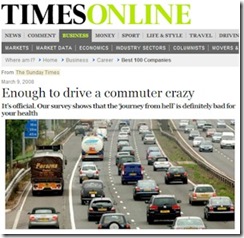Dynamic Work saves economic, ecological as well as social costs, and one dimension of those savings in two areas (economic, social) are the health benefits to flexible working.
The Times covered a study on this topic with a number of personal profiles as illustrations.
“For the first time, our survey has analysed the effects of the daily commute on people’s overall feelings of wellbeing. The results are clear. The longer people spend travelling to and from work, the more their health appears to suffer. In previous years, we have looked at the impact of overtime, but travel times have almost identical effects on work-life balance. At least when employees work long hours, the boss might notice and it is a sign that they are stimulated by their job and regard it as an important part of their life. But endless hours commuting have only a negative effect.”
“The figures are stark: for every two hours that people spend travelling each week, the result for questions on wellbeing goes down by 1.2% on average. People who spend up to two hours a week travelling have an average wellbeing score of 65.4%. For those who spend more than 14 hours a week on the road or in trains, the wellbeing score is just 57.4%. Dr Pete Bradon, director of research at Best Companies Ltd, says that the similarities between the ill effects of overtime and commuting are astonishing. ‘The things most affected by travel time – health, pressure, stress and work-life balance – are exactly the same as with overtime. But there is a compensation with overtime. People say their work is more stimulating, and they gain experience. That all makes sense. The downside of travel is that you don’t get any positive benefits. If your boss sees you doing an extra three hours in the office, he has a great opinion of you but if you drive for three hours a day, he may just think you are an idiot.”
One of the companies profiled was Microsoft UK speaking with my former colleague Theresa McHenry…
“The figures suggest that flexibility about home working is a solution to the problem of commuting. When people can work one day a week from their “home office”, personal growth scores rise by 13.7%, people feel better about their company (up 12.4%) and about the fair deal they are getting (a rise of 11.7%). Reading-based Microsoft UK has 92% of staff doing up to 60% of work from home. Theresa McHenry, who works in training and development, spent 15 years commuting in and out of London. Now she appreciates the chance to work from home. ‘It is the overcrowding and unreliability of trains and Tubes. In the car, you can choose when to leave home, and Microsoft is completely flexible about when you come and go. I work from home one day a week for my own health, but I do use my hour-long drive to and from Reading to prepare and decompress. You can’t do that on a train when you have an inch of personal space.’ “

One thought on “Commuting Crazy”
Comments are closed.